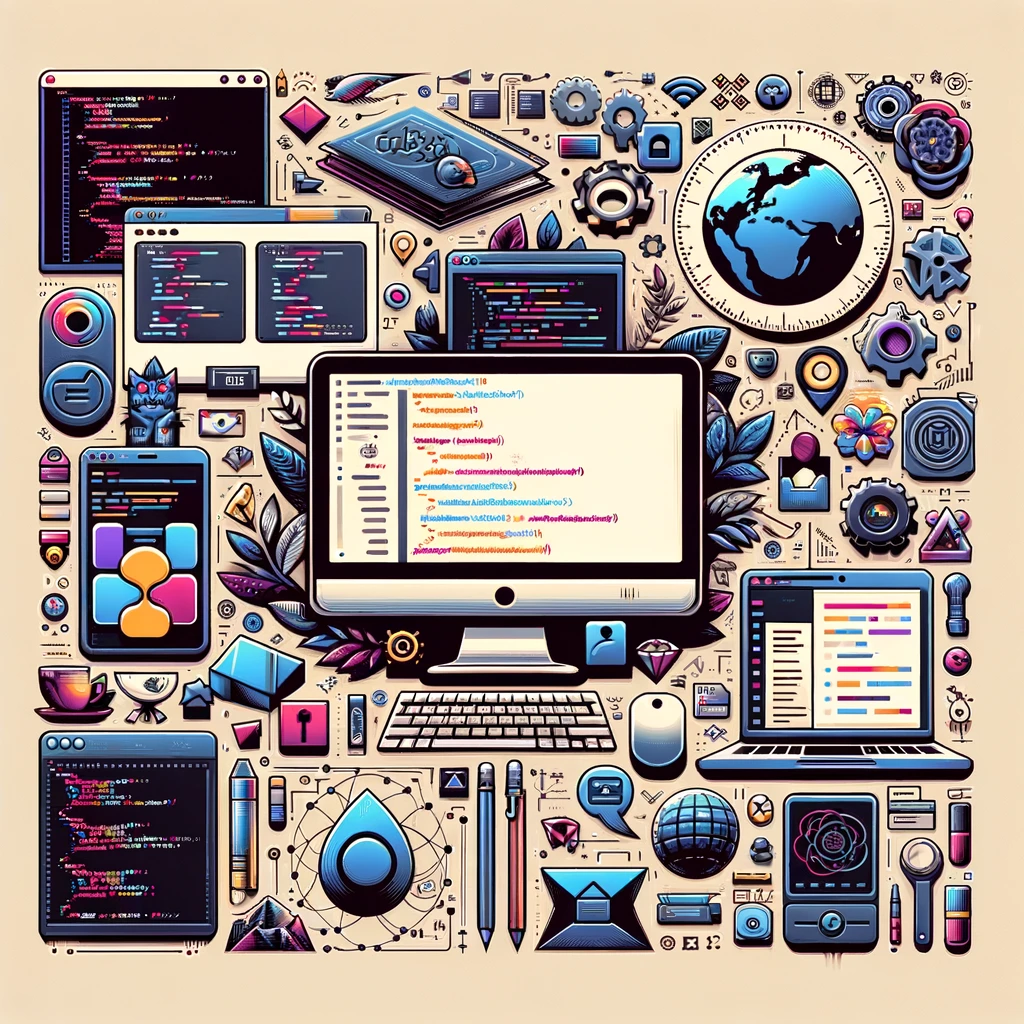I love web development. The creativity is what intrigues me. You can make anything your heart desires.
I have been in this field since 2016 and have made many client and personal websites.

This isn’t just about throwing some code together; it’s a career path that’s recognized as the 5th best job in tech, known for being both well-paid and mentally stimulating. You’re going to find out about the booming job market for web developers and the opportunities it presents.
What Qualifications Do You Need To Become A Web Developer? If you’re considering a career in this dynamic field, you’ll want to keep reading. Not only will I discuss the qualifications you might need, but I’ll also touch on the personal and professional rewards that come with the job. Trust me, it’s a field brimming with potential, and I’m excited to help you understand how to be a part of it.
Who is Suitable for a Web Development Career?
Don’t worry too much about whether web development is right for you. This field is known for its inclusivity, welcoming individuals from all sorts of backgrounds. I came from teaching.
It’s not uncommon to meet web developers with degrees in totally unrelated fields. Choose something that resonates with you, be that structured education or a self-taught route, and dive in. A passion for the work and a curious mind are the real prerequisites for a career in web development.
In my opinion, if you’re asking yourself whether you can become a web developer, you’ve already taken the first step. Now what? Just focus on building your skills, bit by bit. Don’t get bogged down by conventional norms of who can or cannot be in tech. Today, the tech industry is one of the most diverse out there, and your unique perspective is actually your strength.
Essential Skills to Master as a Web Developer

HTML, CSS, and JavaScript.
These are the building blocks of any website and are essential for creating structure, style, and functionality.
Libraries and Frameworks
I’m here to tell you that extending your skillset to libraries and frameworks is a game-changer.
- Bootstrap – This is a styling library
- React/Vue/Angular – You dont have to learn all three. These are the most popular and most used for building user interfaces. React and Vue are most begineer friendly in my opinion.
Being proficient in these enhances efficiency and allows you to build more dynamic user experiences.
Design Skills
But web development isn’t just coding. A well-rounded skillset includes understanding design principles.
- Photoshop – graphics editor
- Sketch – graphics editor
- Canva – graphic design app
- DALL-E 3 – text to image model generative AI that gives you digital images
enabling you to translate a visual concept into a functioning website.
Version Control
Let’s not overlook the importance of version control systems, specifically Git and GitHub. They’re industry standard for managing changes in code, collaboration, and showcasing your projects to potential employers or clients. That’s right, showing off your code can land you a job!
Choose something that resonates with you. You don’t have to learn every tool or framework out there. Start with the essentials and then branch out based on the projects you’re drawn to or the demands of the job market. Remember, web development is about solving real-world problems, not just memorizing syntax
So what are you waiting for? Learn learn how to be a great web developer, and earn a lot of money
Navigating Web Development Qualifications and Certifications
You’re about to discover that breaking into web development may not require the formal education you thought was necessary. It’s a field that’s as accessible as it is diverse, and I’m here to help you with understanding the qualifications needed to kick-start your career.
Now, what is a big misconception? Often, people think they need a traditional four-year degree in computer science to become a web developer. However, that’s not the case. Having solid practical skills and a portfolio can speak volumes – often louder than a degree certificate.
I’ve seen many aspiring developers thrive by showcasing their mastery through real-world projects. These projects demonstrate their skills, problem-solving abilities, and commitment to learning. And this isn’t just about having a couple of snippets of code to show; it’s about displaying fully functional websites or applications that impress potential employers or clients.
That said, don’t worry too much about skipping college unless it’s right for you. Structured learning has its perks, such as providing a comprehensive overview of the field, networking opportunities, and mentorship. If you want to find out about different online learning platforms to get these skills, I dare you to click the button.
The strategy I like to leverage when advising beginning web developers is to find a balance. Combine self-driven projects with structured courses to create a well-rounded skillset. When you’re just starting, your first attempt doesn’t need to be your last. You can always adjust your approach down the road based on what resonates with you and where you see the most growth.
A lot is happening very quickly in tech, and web development is no exception. Staying up-to-date is crucial, and I really hope that you choose the path that keeps you engaged and learning continuously – because that’s what’s going to pay off in the long run.
The Never-Ending Journey: Continuing Education in Web Development
Learning web development is a never-ending journey. That’s not something to shy away from, though—it’s part of what makes this field so exciting. Staying current with the latest trends and technologies is paramount in web development.
You’re going to find out about plenty of resources as you grow into this role. Sure, you’ll pick up books, follow industry leaders, and maybe even contribute to open-source projects. As things change—and they will, sometimes at a breakneck pace—your ability to adapt and absorb new information is what will keep you ahead of the curve.
Continuous learning is not just about keeping up with the industry; it’s also about personal growth and satisfaction. There’s a lot of opportunity in diversifying your skills and deepening your understanding. Whether it’s mastering a new framework, getting comfortable with backend languages, or even stepping into the world of user experience design, each step you take opens new doors.

I really hope that you embrace this journey with enthusiasm and curiosity. The road to becoming a seasoned web developer is paved with challenges, sure, but it’s also lined with milestones and achievements. Keep pushing those boundaries, and remember, your growth as a developer is a testament to your commitment to never stop learning.
Thank you for reading my post. Leave your comments below to participate in this engaging community. Be sure to sign up to receive updates of more incredible articles.
I have been in the web development industry since 2016. It is my desire to guide aspiring and seasoned developers alike through the complex landscape of web development and software engineering. I combine my academic prowess, with degrees from Western Governor University and a Boot Camp certificate from Bloom Tech, with real-world experience to educate and inspire.
As the force behind DevTuneUp.com, I offer a treasure trove of tutorials, how-tos, and insights into the ever-evolving tech industry. With a sharp focus on demystifying technology and a goal to make DevTuneUp.com a cornerstone for tech enthusiasts, I leverage my expertise in SEO optimization and social media marketing to reach and empower a global audience. Join me on this journey to navigate the digital world with confidence and skill.
Nicely written article Jordan. Its good to know that web development is still such a promising and engaging field. I started building websites many years ago with Frontpage and notepad😆. I’ve moved on from web development to IT and software project management type roles. Yes. Continuing education in any tech field is a constant. But now that I’m retiring I’ve been an experiencing a renewed interest in picking it back up again. Who knows? Maybe I’ll take a course or two from my local community colleges after I retire.Thanks for making it all seem possible.
Hey there!
I just read your blog post on “What Qualifications Do You Need to Become a Web Developer?” and I must say, it’s a fantastic resource for anyone considering a career in web development. I appreciate how you broke down the different qualifications and skills needed, making it easy for beginners to understand the path they need to take.
Your tips on learning programming languages, obtaining a degree or certification, and building a portfolio are spot on. It’s great to see that you emphasized the importance of continuous learning and staying up-to-date with the latest industry trends.
As someone passionate about web development, I found your article both informative and inspiring. It’s reassuring to know that there are resources like yours out there that can guide aspiring web developers towards success. Keep up the excellent work!
I’m going to bookmark your site and share it with my friends who are interested in pursuing a career in web development. Looking forward to reading more of your insightful posts in the future. Thanks for sharing your knowledge with us!
Marios
Hey Jordan, your enthusiasm for web development is truly inspiring! I appreciate your comprehensive guide on the qualifications needed to become a web developer. Your emphasis on inclusivity and the diverse backgrounds of successful web developers is encouraging for those considering a career change. The breakdown of essential skills, including coding languages, design principles, and version control, provides valuable insights. Your reassurance that a traditional degree is not the only path and that practical skills and portfolios speak volumes is empowering. Well done. Thank you for sharing!
Hey Jordan,
The information in your topic is of great relevance and value to individuals seeking to pursue a career in web development. It addresses a crucial aspect that aspiring developers often worry about by clarifying the prerequisites and simplifying the path to becoming a proficient web developer. The article’s informative emphasis on the importance of both formal education and practical skills, as well as the need for continuous learning in the rapidly evolving field of web development. Today’s digital age has made this topic especially pertinent, where striking the right balance between academic qualifications and real-world expertise is essential for success in the tech industry.
As I delved into the article “What Qualifications Do You Need to Become a Web Developer” on DevTuneUp, I felt a personal connection to the topic. As someone who’s navigated the path of becoming a web developer, I found the insights here to be invaluable. While formal qualifications can provide a solid foundation, my own journey taught me that hands-on experience, continuous learning, and a passion for problem-solving are equally crucial. This article not only offers practical advice on educational pathways but also reinforces the importance of self-motivation and dedication in carving out a successful career in web development. It’s a testament to the ever-evolving nature of this field and the endless possibilities it offers to those willing to embark on the journey.